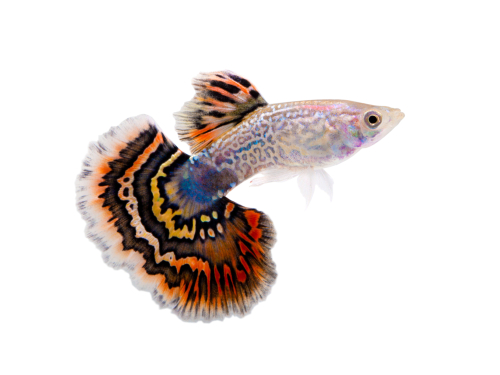Guppies are one of the most popular fish in the aquarium trade, and they are known for their brightly colored bodies and friendly dispositions. Guppies are also relatively easy to care for, which makes them a good choice for beginner fish keepers. One of the questions that many new guppy owners have is how long these colorful little fish can live.
The answer to this question depends on a number of factors, including the quality of the water in their tank, the amount of food they are given, and whether or not they contract any diseases.
In general, guppies can live for two to three years, although some individual fish have been known to live for up to five years. But there’s so much else to know about guppy-keeping than just an average lifespan number.
For one, guppies are a kind of tropical freshwater fish, indigenous to South America. In the rivers of the Amazon, as well as in Barbados, Brazil, Guyana, Trinidad & Tobago, and Venezuela, there are about 300 different varieties of guppies.
Also, guppies come in a range of colors and fin sizes. It is no accident that guppies also go by the name of rainbow fish. You can rest assured that by the end of this article, you’ll have answers to all your questions about guppies and how long they live. Read on!
Contents
How Long Do Guppies Live?
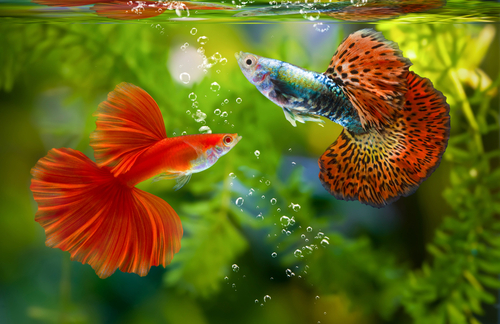
Questions on a guppy lifespan plague many beginners who want these beauties in their aquarium.
Like all other animals, many factors may influence the life expectancy of guppies, but they are hardy fish. As a rule of thumb, we can expect healthy guppies to live for an average lifespan of 1-3 years. In rare cases and with optimal care, guppies may live over five years.
An extended guppies’ lifespan depends on high quality food, an excellent filtration system, and improved guppy genetics. These may help your guppy to live a long and happy life.
It is also crucial to know that if your guppy dies a few months after purchase, you may not be at fault. Sometimes, aquarium owners sell senile guppies to make room for baby guppies.
If your guppy dies, examine the water quality and growth conditions to ensure that the fault was not yours, then make sure to get baby guppies and help them live a long and happy life.
Conditions that Shorten Guppies Lifespan
Various things will influence your guppies’ lifespan. Many of them are under your control, but not all of them. Below are some of the factors that can affect the lifespan of your guppies:
Also read:
1. Guppies Genetics
No one can cheat nature, including guppies. A significant determinant of a guppy lifespan is its genetic makeup.
You have no control over your guppies’ genetic makeup. Most of the time, guppies with weak genetics will pass away before adulthood.
A sensible first step to lengthening the life span of your fish is to buy guppies from expert guppy breeders concerned with producing healthy guppies with good genetics.
Because they usually sell high-quality fish, pet stores are reliable places to buy guppies for a longer lifespan. Guppies bought from the pet store typically live much shorter lives than guppies purchased from breeders, which is concerning, according to reports made by aquarium owners on numerous sites.
2. Poor Tank Conditions
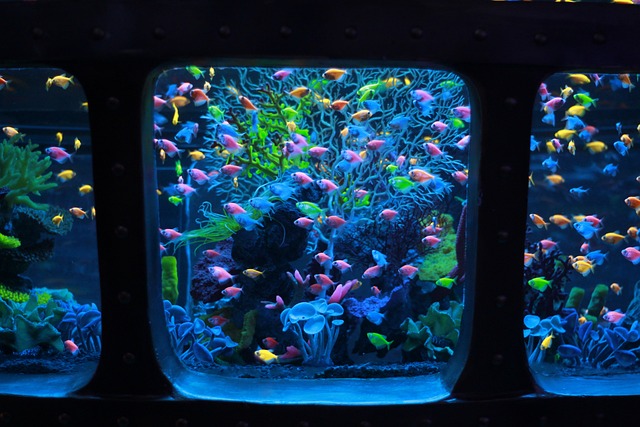
Guppies live their entire lives in your tank. The least you can do is to ensure the tank makes a suitable home for them.
Poor tank conditions cause a variety of fish, including guppies, to suffer severe injuries or die.
If their tank is congested, too small, or infested with germs and parasites, guppies will not live as long as they should. Although guppies are hardy fish, they will not thrive or survive very long if kept in substandard conditions.
Guppies can respond to stress in a similar way to how humans do. Your guppy fish may experience stress for a variety of reasons. The most frequent causes of stress for guppies are as follows:
3. Poor Quality of Water
Your guppies may experience significant stress due to poor water conditions like low or high water temperatures, ammonia, or sudden changes in water variables from tap water. Try to give them the optimum environment possible to lessen stress on the guppies.
4. Cohabiting with Other Aggressive Fish
To keep healthy fish, you must consider the tank mates you choose for your guppies.
If you keep your guppies in a communal tank with other fish, it might stress them out. To avoid harming your guppies, it is wise to keep them with peaceful fish.
5. Overcrowding
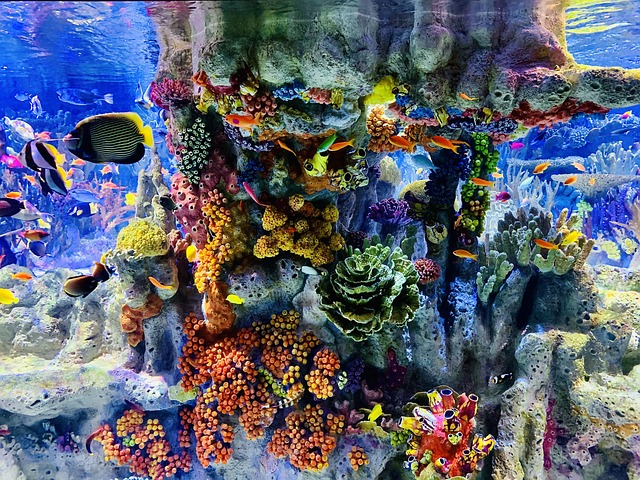
Because fish breathe in oxygen and exhale carbon dioxide similarly to humans, an overcrowded fish tank will have less oxygen.
Furthermore, guppies may suffer significantly due to the decreased oxygen content of the air.
If you spot symptoms like gill movement that happens quickly and frequent swimming towards the surface, your guppies are probably gasping for air. Low oxygen tension may cut short the lifespan of guppies.
Your guppies may experience significant stress if their tank is overcrowded. Use this simple calculation to determine how many guppies can fit in a fish tank: 1/gallon = 1 guppy.
This works well for guppies. The formula can also help you choose the minimum tank size to accommodate the guppies in your tank.
6. Excessive Light
Guppies get a decent night’s sleep. They require a fair amount of darkness to rest. Too much light brings on stress and eventually death. If you have artificial lights, switch them off in the aquarium for at least six hours daily. You can set it on a timer if you frequently forget to turn the lights on and off.
7. Insufficient Sanctuaries
Guppies do not hide while they are at ease. Yet, offering them a hiding spot is an excellent idea. Female guppies need to unwind because male guppies can make them very agitated. They will hide amid the fish tank plants or other decorations.
Live plants can help guppy fry thrive if you keep them in your aquarium. You can improve water quality in the fish tank with the aid of aquarium plants.
8. Pregnancy
Guppies are often productive livebearers, producing up to 30 guppy fry on average and even more in exceptional conditions. Although the gestation period can vary, guppies tend to give birth between 21 and 30 days. If both male and female guppies are in the same tank, you will soon find several small fries tucked away among the plants.
Unfortunately, a female guppy finds pregnancy stressful and frequently becomes pregnant. The frequent reproductive cycle shortens the female lifespan and causes the males to live longer.
If you ensure that there are always more female guppies in your aquarium than male guppies, you can ease some of the stress this condition brings. As a result, the harassment of female guppies will not be as severe. A proportionate male-to-female ratio will help your female guppies live longer.
Provide the fish with plenty of thick cover and other hiding places, so the females can flee the male’s advances if they choose to.
Common Signs of Stress in Guppies
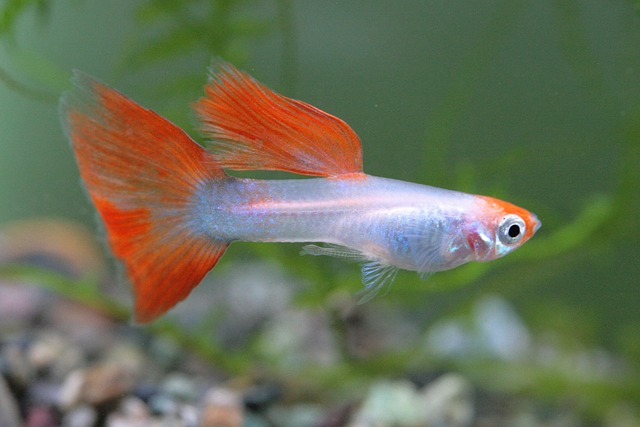
You need to be on the lookout for indicators of stress, look into the cause, and make changes in your management routine. In turn, this will help your guppies live longer. These stress indicators include:
1. Skin Discoloration
When under duress, other fish turn darker, but a guppy can turn exceedingly pale. Ensure that their characteristically stunning colors are not fading.
2. Swimming on the Water’s Surface
Being the tank area with the highest oxygen concentration, a fish will do this when they need more oxygen. This major red flag suggests that the water quality in the tank is relatively poor.
3. Inappetence
A stressed or ill fish will typically not want to eat anything, just like humans. So, when you notice uneaten food in your tank, be vigilant and attentive to your guppy’s health.
4. Fatigue
Guppies are active swimmers. Your guppy’s behavior may have changed, which could signify an illness. Guppy fish are also group swimmers. Therefore, if one of your fish is separated from the others and is not moving around as much, it might be ill.
Make sure to keep an eye on your fish so you can spot any unusual behavior in any of your guppies. You will only be able to tell whether your guppy is well if you know how your fish typically behaves.
5. Open Sores on Guppies
Fighting aggressive tank mates may cause open sores, or they may be a sign of the more dangerous disease TB. If a fish is touched directly, tuberculosis in fish can spread to people. It spreads between humans and fish.
Unfortunately, there is no treatment for fish tuberculosis. You must allow your fish to continue if they do not succumb to the disease immediately. Given HPV’s contagiousness, you should do this as soon as possible. It would be best if you acted promptly to prevent other fish in the aquarium from contracting tuberculosis.
Ideal Growth Requirements for Guppies in the Aquarium
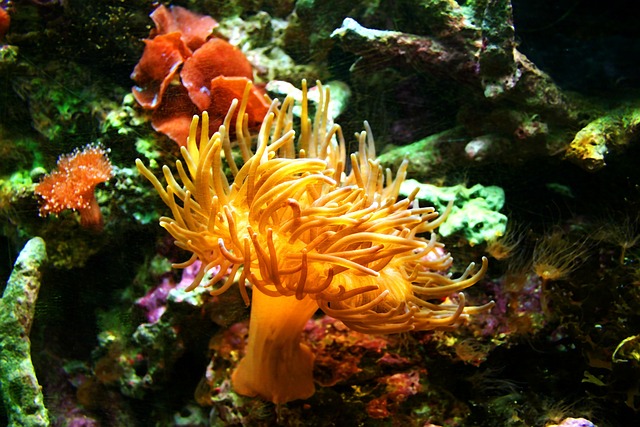
Fortunately, you can improve your guppy’s lifespan in several ways. If you adhere to the following tricks on guppy fish breeding, your guppies will have the best chance of living long and fulfilling lives.
Ideal requirements for guppy fish in the aquarium include:
1. High Quality Food
Guppies require both plant and animal components in their diet. Algae, plants, and fruit are examples of plant matter. Worms, insects, and tiny fish are examples of animal matter.
Your guppy will consume anything that attracts it, depending on what that is. Guppies typically eat both types of food because they are omnivorous.
Their unselective nature makes it easy to feed your guppy. Ensure that you provide them with high quality food with a well balanced diet.
You can include fish food, frozen food, and live food in their diet. The live food may be of plant or animal origin. Live food of animal origin includes mosquito larvae and brine shrimp. Baby brine shrimp can be frozen and given to the guppies as freeze dried foods.
You can also give live aquatic plants, flakes, pellets, veggies like cucumber or zucchini, fish flakes, frozen foods, and worms to your guppy.
Feeding your guppy with quality food is crucial in extending their life span.
2. Tank Size
If your guppies were not bred for size, a mature male should be at most 1.4 inches, while female guppies should not exceed 2.4 inches on average. Guppies require much space to move freely despite their small size.
The tank size will be your priority if you keep many guppies. Remember that each fully-grown guppy needs at least 1-3 gallons of water to understand better how much space you will need. For instance, if you choose to keep seven guppies, you would need a tank of up to 20 gallons in size.
I often advise a 10-gallon tank if you are beginning to keep guppies. This size tank is suitable for most aquarium equipment and provides room for 3-5 guppies as tank mates. The aquarium only requires a little space, allowing you to put it on a desk or a small table.
Using these pointers ought to make picking the ideal tank size much simpler. However, if you can buy an even larger aquarium, that is even better. You can always add more fish to a larger aquarium. The extra space will be a redeeming quality when your older guppies start breeding.
3. Water Parameters
Guppies are native to tropical regions. The temperature is typically warmer throughout the tropics, and their water parameters adjust to fit the climate. Tropical areas experience temperatures of 64.4° Fahrenheit (18° Celsius). For this reason, guppies require a fish tank with a warmer water temperature. Guppies prefer a water temperature range of 72 to 82 degrees Fahrenheit (22 to 28 degrees Celsius).
Other essential water parameters to note are water pH and water hardness.
4. Water Hardness

Although water hardness is essential in guppies’ survival and growth, many aquarium owners overlook its significance.
Fish require a specific range of water hardness to flourish, and if any of these parameters are not optimal, stress and even death may result.
The term “water hardness” denotes the total amount of dissolved minerals in the water.
When there are many dissolved minerals present, “hard water” describes the water type, whereas there are few minerals in “soft water.”
You must understand the connection between your water’s hardness and pH. Because the minerals function as buffers and lower the quantity of acid (pH) in the water, hard water typically has a high pH. GH 8–12 is the best range for guppy fish in water hardness.
5. Water pH
The alkalinity or acidity of a particular substance is determined by its pH. It is measured on a scale of 1 to 14, with 7 representing a neutral pH.
Low pH values are acidic, whereas high pH values are referred to as alkaline or basic. In contrast, the pH of regular household tap water is 7. However, because of the chemicals that are dissolved or suspended in the water, the pH of the water in your tank is different.
If the pH of the water in your tank for guppy fish is discovered to be less than 6.8, you would need to adjust the pH of the water.
6. Changing the Water in Your Tank
It is crucial to change the water in your aquarium regularly. Waste produced by fish is detrimental to them. The only way to clean the water column and eliminate trash is to change the water.
Some fish keepers say if you have a low stock (few fish), change the aquarium’s water once in one to two weeks. Most of the time, you can replace the water with tap water, but you must remember the following:
- To eliminate chlorine and heavy metals from your tap water, use a water conditioner; alternatively, you can let the chlorine evaporate in the open for 24 hours.
- Verify that the water in your tank and your faucet are at the same temperatures.
7. Cohabiting with Other Guppies
Some fish owners love to raise only male or female guppies, but not both sexes. However, if you choose to raise both sexes, you must note that the quantity of fry born will depend on the proportion of female guppies in the tank. It is straightforward.
Guppies are very productive fish and can produce hundreds of fry at once. Therefore, if there are many female guppies, things can quickly spiral out of hand. Remember that having only female guppies in the tank with a handful of males can make them very stressed out since male guppies will fight for their attention. Some male guppies will even resort to bullying and harassment to win over a female.
Consecutively, you might keep more female guppies and fewer males in your aquarium. Without stressed-out female guppies, this will still have the same outcome.
8. Keep One Sex of Guppies
It is less stressful for you and the guppies to keep only female guppies or only male guppies.
When you keep only female guppies, they will not be as stressed as when there are male guppies in the tank. Males in the tank will also increase aggression in the tank.
Conclusion
How long do guppies live? Guppies are popular options for most aquarium owners. Due to their moderate size and ease of maintenance, they are most popular as starter fish.
Guppies typically live for two years. However, you can extend their life span depending on the species and your management routine. In a typical home aquarium with acceptable water quality, most guppies will live between six to twelve months.

Ian Sterling, founder of Fishlab.com, began his aquarium journey over 30 years ago, driven by a deep fascination for fish and their diverse personalities. His website, Fishlab.com, is dedicated to making fishkeeping accessible and enjoyable, offering beginner-friendly guidance, expert insights, and a community for aquarists to connect and share experiences.


